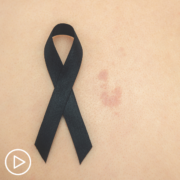How Does Immunotherapy Treat Advanced Non-Melanoma Skin Cancer?
How Does Immunotherapy Treat Advanced Non-Melanoma Skin Cancer? from Patient Empowerment Network on Vimeo.
How does immunotherapy treat advanced non-melanoma skin cancer? Dr. Anna Pavlick delves into the mechanisms of immunotherapy and common side effects.
Dr. Anna Pavlick is a medical oncologist and the founding Director of the Cutaneous Oncology Program at Weill Cornell Medicine and NewYork-Presbyterian. Learn more about Dr. Pavlick.
See More from Evolve Non-Melanoma Skin Cancer
Related Resources

When Should Clinical Trials Be Considered for Advanced Non-Melanoma Skin Cancer Treatment? |

|

|
Transcript:
Katherine:
Dr. Pavlick, would you explain how immunotherapy uses a patient’s own immune system to treat cancer in the body?
Dr. Pavlick:
Sure. Immunotherapy is very, very different than chemotherapy. As you know, with chemotherapy, chemotherapy is designed to attack rapidly dividing cells. And so, cells that are rapidly dividing are also some of your immune cells.
And so, patients can get anemia. They can get problems where they’re at risk of infection because the bone marrow if moving very quickly. Immunotherapy on the other hand really doesn’t affect any cells that are rapidly dividing. I like to tell patients it wakes up their immune system. We all have what we call T cells that are living in our lymph nodes.
And immunotherapy really stimulates the body to produce more of those killer T cells and those memory cells and those cells that are out there to go and attack cancer and also creates memory. If, in fact, there is a cell that may be hiding or what we call dormant, if that cell were to decide it’s time to wake up and start growing, your immune system is going to remember the proteins that are on that particular cell and wake up your body’s immune system again to attack that cancer cell before it becomes a tumor.
And so, that’s what we see with immunotherapy is when people have very dramatic responses and their immune system is able to eradicate their cancer, many times it’s a lifelong durable process. And so, because that immune system is constantly upregulated and on surveillance, we think that this translates into why people do so well for so long.
Katherine:
So, which advanced non-melanoma patient type is immunotherapy right for?
Dr. Pavlick:
Pretty much all of them.
Anti-PD1 therapy, this is the most common type of immunotherapy that we use for non-melanoma skin cancers. And they’re approved for squamous cell cancer, basal cell cancer, Merkel cell, all very, very highly active and produce really impressively good results with long-term durable responses. So, sometimes when we talk about basal cell cancer, there are two types of therapies that we can talk about when it comes to basal cell.
We talk about immunotherapy, but we also talk about targeted therapies which are the hedgehog inhibitors. And there are pros and cons to both types of treatments, but when it comes to basal cell, we’ve got those two options. When it comes to Merkel cell and squamous cell, our first go-to option is really immunotherapy with anti-PD1 agent.
Katherine:
But I wanted to know what the common side effects are for using immunotherapy to treat non-melanoma skin cancer.
Dr. Pavlick:
Sure, when it comes to what we call adverse events or side effects from immunotherapy, when we give patients these single-agent anti-PD1 medicines, the chances of them having side effects are probably in about the 20 percent range. So, there’s a very large proportion of patients who are coming into the office getting these treatments and never have one side effect. But if you’re going to have any side effects, the most common side effects can be rash or itching.
They don’t need to be together, so you can have a rash that doesn’t itch. You can itch and not have a rash. Those are really the skin toxicities. Sometimes with prolonged treatment, some patients may develop an underactive thyroid gland because the immune system will also attack some of the thyroid cells and slow down its function.
And so, those patients need to be given thyroid medicine. Fortunately or unfortunately, that’s one of the side effects that is a not-reversible side effect. And so, if we slow down your thyroid, you’re going to be committed to taking thyroid medicine for the rest of your life, which is essentially one tiny little pill every morning. But patients do need to know that. These drugs get metabolized by the liver and the kidneys.
And so, before we give patients their infusion, we always check their liver and their kidneys to make sure that the immunotherapy hasn’t caused an inflammation of the liver or an inflammation of the kidneys making it not safe to give immunotherapy at that point in time. It doesn’t mean that we can’t go back and give it again. We just need to let those organs recover. Give them medicines to calm down the inflammation and then we can resume treatment.
Any time you give patients an immunotherapy, the side effects can be very vast because they cause inflammatory side effects. So, anything that you can put an -itis on the back of it, so dermatitis meaning inflammation of the skin, colitis meaning inflammation of the colon which can lead to diarrhea or bloating or a feeling of some baseline nausea if it affects the small bowel instead of the large bowel.
Pneumonitis is an inflammation of the lungs. Any kind of -it is, one of the more rare things is what we call uveitis and it’s an inflammation of the back of the eye where it makes it difficult for patients to see, very easily diagnosed by an ophthalmologist and treated with either steroid eye drops or a short course of oral steroids that will get everything calmed down. And even if that happens, it doesn’t mean that you can’t go back and retreat those patients. So, any type of inflammatory symptom is a potential side effect.



